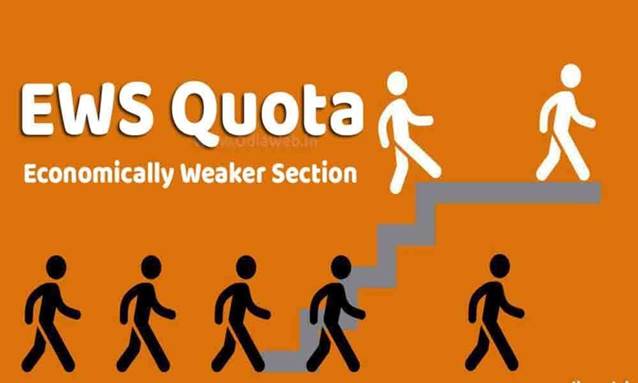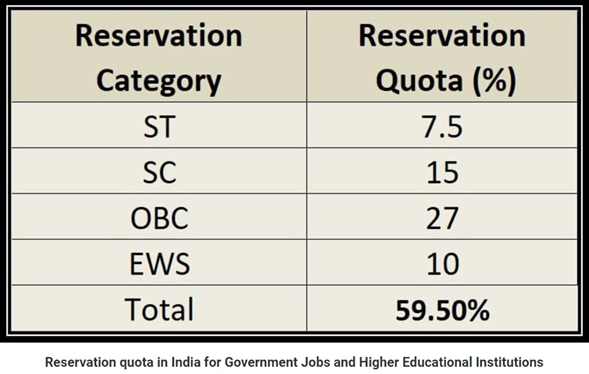EWS Quota

Copyright infringement not intended
In News
- The Supreme Court to examine whether the 103rd Constitutional Amendment Act violates the basic structure of the Constitution.
- 103rd Constitutional Amendment Act introduced a 10% quota for Economically Weaker Sections (EWS) in government jobs and educational institutions.
Details
- The Constitution Bench led by the Chief Justice of India (CJI) has decided to examine three key issues to verify the validity of the 103rd amendment.
- Whether the 103rd Constitution Amendment breach the basic structure of the Constitution by making special provisions, including reservation, based on economic criteria.
- Whether the amendment can be said to breach the basic structure…by making special provisions in relation to admission to private unaided institutions.
- Whether the basic structure is violated by “excluding the SEBCs (Socially and Educationally Backward Classes)/ OBCs (Other Backward Classes)/ SCs (Scheduled Castes)/ STs (Scheduled Tribes) from the scope of EWS reservation”.
- The primary argument, in this case, is that the amendment violates the basic structure of the Constitution. However, there is no clear definition of basic structure.
- It violates the Supreme Court’s 1992 ruling in Indra Sawhney & Ors v Union of India, which restricted reservations at 50%. The court held that economic backwardness cannot be the sole criterion for identifying a backward class.
- The Ministry of Social Justice and Empowerment argued that under Article 46 of the Indian Constitution, the state has a duty to protect the interests of economically weaker sections: “The state shall promote with special care the educational and economic interests of the weaker sections of the people, and, in particular, of the Scheduled Castes and the Scheduled Tribes, and shall protect them from social injustice and all forms of exploitation.”
103rd Constitution Amendment Act
- The Amendment inserted Articles 15(6) and 16(6) in the Indian Constitution to provide up to 10 % reservation to Economically Weaker Sections (EWS) in higher educational institutions and initial recruitment in government jobs.
- The amendment empowered state governments to provide reservations based on economic backwardness.
- Eligibility under EWS;
- A person who was not covered under the scheme of reservation for SCs, STs, and OBCs, and whose family had a gross annual income below Rs 8 lakh, was to be identified as EWS for the benefit of reservation.
- A Person whose family owns or possesses any of the following assets shall be excluded from being identified as EWS, irrespective of the family income:
- 5 acres of agricultural land and above.
- The residential area of 1000 sq ft. and above.
- Residential plots of 100 sq. yards and above in notified municipalities.
- A residential, plot of 200 sq. yards and above in areas other than the notified municipalities.
Reservation System in India
- The Reservation system is an arrangement of affirmative action where a certain percentage of seats are reserved in Public employment and educational institutions.
- In India, the Scheduled Castes (SCs), Scheduled Tribes (STs), Other Backward Classes (OBCs) and socially and economically backward communities who were earlier poorly represented in the Public sector and educational institutions are now covered under the reservation facility.

- In India, about 60% of seats are reserved for various sections like ST, SC, OBC, and EWS in Government jobs and Higher Education Institutions.
- 3% of seats are also reserved for differently-abled persons across all categories.
- The reservation policy is also enforced for the Scheduled Castes and Scheduled Tribes for representation in the Indian Parliament.
- The reservation issue has also remained a cause of conflict between the reserved and the non-reserved sections of society.
Arguments in the favor of Reservation System
- It ensures equality, by providing opportunities to people from backward classes.
- It promotes justice and human rights.
- Decreasing inequality by promoting economic opportunities for the lower section of Society.
- Correcting historical injustice
- Reservation provides a level playing field as it is challenging for people from backward sections that were historically deprived of education, skills, and wealth to all of a sudden start competing with those who had access to those resources for years.
Arguments against Reservation System
- It Promotes Casteism and creates division in our society, and also encourages caste-based Politics.
- Beneficiaries of reservation are mostly from the dominant class in backward castes. Thus, the marginalized section remains marginalized.
- Affects the productivity of an organization if unfit candidates get the opportunities.
- A reservation only provides a limited and short-term solution to historical injustice issues.
- Many deserving people from the upper castes are also affected by poverty and illiteracy.
- Reservation demands by various groups may cause social turmoil, such as during the Mandal Commission (1990).




1.png)
